
The following funding opportunities have been announced. Please follow the links for more information:
Wellcome Trust
This scheme allows universities to attract or retain outstanding research staff at an early to mid-stage in their careers by providing support for up to five years, after which time the applicant takes up a guaranteed permanent post in the university. Up to five years’ support is available, providing your full salary for three years, 50 per cent in the fourth year and 25 per cent in the fifth year. Travel expenses to attend meetings are provided for five years, but research expenses are provided for the first three years of the award only.
Closing Date for preliminary applications: 23/1/15 at 17.00
Closing Date for Full application: 02/4/15 at 17.00
Innovate UK
This call for proposals is seeking to achieve a step-change in UK Border Security through new technologies for detecting people hidden in vehicles. Funding will be provided by the Home Office’s Centre for Applied Science and Technology (CAST) and Border Force. CAST exists to protect the public using science and technology by providing high quality, impartial advice, innovative solutions and frontline support to the Home Office and its partners. Border Force is a professional law enforcement command within the Home Office and is responsible for securing the UK border and controlling migration at 138 ports and airports across the UK and overseas.
Award: £400k for all Phase1 contracts
Registration Closes: 07/1//2015
Closing Date: 14/1/2015
Wellcome Trust
This scheme enables clinicians, scientists and other healthcare professionals to undertake up to 6 months (FTE) of research at a centre or department with academic expertise in medical humanities, to explore the wider determinants and contexts of their own medical and scientific work. Awards can last for up to six months. We will provide the salary of a locum or replacement lecturer for the duration of the award, and a set amount for travel to conferences.
Closing Dates for preliminary applications: 23/1/2015
Closing Date for full applications: 2/4/2015
Art and Humanities Research Council
Collaborative Doctoral Awards are intended to encourage and develop collaboration and partnerships between Higher Education Institution (HEI) departments and non-HEI organisations and businesses. These awards provide opportunities for doctoral students to gain first hand experience of work outside the university environment. The support provided by both a university and non-university supervisor enhances the employment-related skills and training a research student gains during the course of their award. The studentships also encourage and establish links that can have long-term benefits for both collaborating partners, providing access to resources and materials, knowledge and expertise that may not otherwise have been available and also provide social, cultural and economic benefits to wider society.
Closing Date: 10/12/14 at 16.00
Wellcome Trust
We will support researchers who have an international track record of significant achievement, who have demonstrated the originality and impact of their research, and who are leading their field. Senior Investigator Awards provide flexible support at a level and length that is sufficient to enable exceptional researchers to address the most important questions about medicine in its social, cultural, and historical contexts. The Medical Humanities funding scheme supports bold and intellectually rigorous research applications that address important questions at the interface of medicine, health-related sciences, and the wider humanities. While we encourage interdisciplinary work, our principal aim is to fund the best research by the brightest scholars at all stages in their academic careers.
Typical Senior Investigator Awards are for up to five years and provide a generous and flexible package of funding.A Senior Investigator Award might be in the range of £100k to £200k per year, depending on the needs of your research and your ability to justify the proposed costs.
Closing date for preliminary applications: 23/1/2015
Closing date for full applications: 2/4/2015
Wellcome Trust
Researchers should be able to articulate a compelling vision for their research and demonstrate the talent, track record and originality to achieve it. New Investigator Awards provide flexible support at a level and length that is sufficient to enable exceptional researchers to address the most important questions about medicine in its social, cultural, and historical contexts. The Medical Humanities funding scheme supports bold and intellectually rigorous research applications that address important questions at the interface of medicine, health-related sciences, and the wider humanities.While we encourage interdisciplinary work, our principal aim is to fund the best research by the brightest scholars at all stages in their academic careers.
Typical New Investigator Awards are for up to five years and provide a generous and flexible package of funding. A New Investigator Award might be in the range of £100k to £200k per year, depending on the needs of your research and your ability to justify the proposed costs.
Closing date for preliminary applications: 23/1/2015
Closing date for full applications: 2/4/2015
Wellcome Trust
This scheme allows universities to attract outstanding research staff by providing support for up to five years, after which time the award holder takes up a guaranteed permanent post in the university. Up to five years’ support is available, providing your full salary for three years, 50 per cent in the fourth year and 25 per cent in the fifth year. Travel expenses to attend meetings are provided for five years, but research expenses are provided for the first three years of the award only.
Closing date for preliminary applications: 23/1/2015
Closing date for full applications: 2/4/2015
Wellcome Trust
This scheme is intended for practising health professionals who wish to carry out research in any area within the remit of the Society and Ethics Programme, either full-time or part-time, while maintaining their work commitments. The research should address a real-life issue in the candidate’s professional practice that is relevant to the Programme. Part-time fellows will be expected to spend at least 50 per cent of their time on their research. This scheme can be used to enrol on a PhD for those who have little or no humanities or social science experience. The scheme can also be used to undertake postdoctoral research. It is particularly aimed at people who intend to pursue a long-term academic career exploring the ethical or social aspects of biomedical research or health interventions.
The fellowship will enable successful candidates to pursue their social and ethical research interests in one or more appropriate departments or research facilities.
An award will not normally exceed £250 000, exclusive of any standard Wellcome Trust allowances. The fellow’s salary is provided, plus appropriate employer’s contributions. Essential research expenses, including travel and fieldwork, are available, as is a set amount for travel to conferences, seminars and other meetings of a scholarly nature. If enrolling for a PhD, an agreed salary will be provided, together with PhD registration fees, research expenses and a contribution to travel and general training costs. The maximum duration of the award is three years full-time. Candidates wishing to apply for a part-time award will be handled on a case-by-case basis, but awards will typically not be longer than four years in duration. The time permitted for professional activities or other non-research activity during the fellowship is normally restricted to a maximum of eight hours or two programmed activities per week.
Closing date for preliminary applications: 23/1/2015
Closing date for full applications: 2/4/2015
Arts & Humanities Research Council
This highlight notice, open until the end of July 2015, seeks to encourage research networking applications that explore innovative areas of cross-disciplinary enquiry that straddle the remits of the AHRC and other Research Councils and which involve significant boundary-crossing engagement and exchange between arts and humanities researchers and researchers/ practitioners in emerging areas of science and technology (broadly defined, including social science, engineering and medicine). We hope that the networking awards funded under the highlight will help to bring distinctive arts and humanities perspectives and approaches more centrally into these emerging fields of cross-disciplinary enquiry. The highlight notice also provides an opportunity to build networks to explore, through inter-disciplinary dialogue, how arts and humanities research might play a leading role in the development of research agendas in a number of areas (see below for further information) of potential future collaborative working across the Research Councils.
We will welcome proposals which are more exploratory or speculative in nature in terms of developing the potential for future cross-disciplinary engagement in areas where there may have been limited previous engagement between different research communities and recognise that in some cases this may generate increased risks or uncertainty around the research outcomes. Proposals which draw on a range of perspectives and subjects from within the arts and humanities will be strongly welcomed but proposals which are only or primarily cross-disciplinary within the arts and humanities will not fit this highlight notice (though of course will be welcomed under the networking scheme more generally).
Closing Date: 31/07/2015
Arts & Humanities Research Council
To mark its tenth anniversary in 2015, the AHRC is looking to extend its partnership with Cheltenham Festivals by inviting applications from researchers to present their research at one of a series of six engaging public events at the Cheltenham Jazz and Music Festivals in 2015. Cheltenham Festivals is the charitable organisation behind the town’s internationally acclaimed Jazz (opens in a new window), Science (opens in a new window), Music (opens in a new window) and Literature (opens in a new window) Festivals. Through cutting edge and creative programming, Cheltenham’s four festivals have provided a platform for debate and commentary from scholars across the world.
Up to twenty successful applicants will have a chance to develop their event ideas with experienced Cheltenham Festival producers and members of the National Co-ordinating Centre for Public Engagement at a dedicated workshop. Of these, up to six will have the chance to hold their event at either the Jazz or Music Festivals. An initial workshop to be held on 6th January 2015 will focus on these festivals. The selected researchers will benefit from a unique opportunity to work closely with the Cheltenham Festival producers to create interactive and engaging events, invite high profile speakers, where relevant, and ultimately share their research with a public audience. We welcome applications from individual researchers or project teams with one lead applicant, working in all areas of the arts and humanities. The topics of the proposed events should fall within one of the disciplines within the AHRC’s remit, and should fit into the themes of the Festivals.
Closing Date: 1/12/2014
Engineering and Physical Sciences Research Council
The Manufacturing the Future Theme is looking to establish a number of Fellowships that will act as a response to the Manufacturing Foresight report, focussing on the Manufacturing research opportunities around the key technologies that are likely to, when integrated into future products and networks, collectively facilitate fundamental shifts in how products are designed, made, offered and ultimately used by consumers. Successful Fellowships for the Future of Manufacturing will be expected to not only undertake leading research but also inform the research agenda around the challenges highlighted in the Foresight report, linking with the key activities required to enable this.
These Fellowships are intended to be analogous to the prestigious Dream Fellowship award, enabling talented researchers to take time out from their everyday activities, to give them the freedom to gain new knowledge of novel creative problem solving techniques, explore new radical ideas and develop new ambitious research directions, but in this case concentrating on key research issues for the UK that were identified in the Manufacturing Foresight report
Closing Date: 9/12/2014 at 16.00
Innovate UK
The aim of this competition is to help companies develop innovative ways to: reduce the production of waste, use resources such as energy, water and raw materials more efficiently, improve the productivity of food manufacturing and processing operations, improve the resilience of the food supply chain by making better use of resources and reducing environmental stresses on food systems.
Proposals must be collaborative and business-led. We expect to fund mainly industrial research projects in which a business partner will generally attract up to 50% public funding for their project costs (60% for SMEs). We expect projects to range in size from total costs of £250k to £1m, although we may consider projects outside this range.
The deadline for expressions of interest is 3/12/2014 at 12.00
Economic and Social Research Council
The interest in wellbeing is growing both nationally and internationally and the UK is regarded as one of the leading countries in this area. International focus has been on how societies, governments, communities and populations measure their progress, economic and social – including the UK’s Legatum Institute’s Commission on Wellbeing and Policy. In November 2010, David Cameron launched a national ‘measuring wellbeing’ programme undertaken by the Office of National Statistics (ONS) driven by public consultation. ONS now publishes regular wellbeing reports and data at a national and local level and has developed a measurement tool for wellbeing comprising 10 domains. A recent All Party Political Group has published a report on translating wellbeing evidence into policy.
Decisions about good public services are made on the basis of strong evidence and what works. The government has established a number of What Works Centres to enable evidence to better inform decision making and ESRC has invested heavily in these. ESRC is now embarking on a joint three year investment with Public Health England, Arts and Humanities Research Council and a number of government departments and other partners to further progress the understanding and application of wellbeing evidence.
Closing Date: 2/12/2014 at 16.00
British Academy
The British Academy, the UK’s national academy for the humanities and social sciences, is currently inviting outstanding proposals for our 2016 conference programme. This presents an exceptional opportunity for UK scholars who can demonstrate academic leadership and vision to run a landmark conference featuring leading-edge research as part of the Academy’s events programme. (Lists of recent British Academy Conferences). Any UK-based scholar is eligible to submit a proposal. If successful, you will be the academic convenor of the conference, and the British Academy’s staff will handle the administration of the conference, so that you can focus on ensuring the quality of the scholarship presented is of the highest possible calibre.
We are inviting proposals for conferences to be held in 2016. British Academy conferences:
- are held at the British Academy’s premises at Carlton House Terrace (in central London close to Westminster and Piccadilly Circus, and easily accessible by train from each of London’s five airports)
- are ideal for up to 135 participants
- offer the opportunity to bring together a large number of academics from different subject areas
- include the possibility that a themed volume of essays arising from the conference might be published in the Proceedings of the British Academy series
The deadline for the submission of proposals (including the references) is 27/2/2015.
Wellcome Trust
This scheme supports individuals at all stages of their career not in established academic posts, wishing to undertake a period of research. Strong preference is given to applicants with a good prospect of achieving an academic career as a specialist in medical humanities. The maximum duration is three years. The awards are full-time but can be tenable on a part-time basis if a case can be made that personal circumstances require this. Fellowships provide research expenses and a salary, plus appropriate employer’s contributions. Research expenses include travel to libraries and archives or overseas fieldwork, and a set amount for travel to conferences, seminars and other meetings of a scholarly nature.
Closing date for preliminary applications: 23/1/2015
Closing date for full applications: 2/4/2015
Wellcome Trust
The Wellcome Trust wishes to provide support for four-year Basic PhD Programmes in academic institutions in the UK and the Republic of Ireland (RoI). Wellcome Trust Four-year PhD Programmes were introduced in 1994 and are noted for the high-quality postgraduate training they provide.
The Trust hopes to continue to support the best graduates in leading academic research environments, where they will receive high-quality, specialised and innovative training that will ensure they can meet future challenges in their chosen field of biomedical or public health research. There are currently 28 recruiting PhD programmesbased at UK and RoI institutions.
Support for each PhD programme will be for a period of five years, with an annual intake of typically not more than five students, reflecting the availability of high-quality training opportunities within the programme.
Preliminary application deadline: 8/12/2014 at 5pm
Full application deadline: 27/4/2015 April 2015 at (5pm)
Wellcome Trust
This scheme is for individuals not yet in established academic posts, who wish to undertake a period of postdoctoral research. Due to the multidisciplinary nature of research on the social and ethical aspects of biomedicine and healthcare, Research Fellowships may provide postdoctoral researchers with support to enable them to obtain research training, either in a new discipline or in a new aspect of their own field, e.g. a humanities scholar who wishes to be trained in social science.
In such cases, the requested training must form a substantial component of the proposed research and should not normally be available via the standard funding routes, e.g. by learning new skills as a postdoctoral researcher on a project grant. The requested training should also include methodologies and skills that are new to the applicant. Research training provision can include participation in taught courses, and periods spent in other research groups gaining practical, technical or other skills for introduction to the sponsor’s or individual’s own group.
The maximum duration is three years. An award will not normally exceed £250 000, exclusive of any standard Wellcome Trust allowances. The awards are full-time but can, in exceptional circumstances, be tenable on a part-time basis if a case can be made that personal circumstances require this. Fellowships provide a salary, plus appropriate employer’s contributions.
Closing date for preliminary applications: 23/1/2015
Closing date for full applications: 2/4/2015
Chist-era
CHIST-ERA is looking for transformative and highly multidisciplinary research projects in Information and Communication Sciences and Technologies (ICST). They should explore new ideas with potential for significant scientific and technical impacts in the long term. Each year, CHIST-ERA launches a call for research proposals in two new topics of emergent scientific importance. Between 2010 and 2013 the following topics were supported: Quantum Communication, Autonomic Systems, Knowledge Extraction, Low-power Computing, Intelligent User Interfaces, Adaptive Communication Networks, Adaptive Machines and Distributed Computing. In the Call 2014, two separate topics are addressed, namely:
- Resilient Trustworthy Cyber-Physical Systems (RTCPS)
- Human Language Understanding: Grounding Language Learning (HLU)
Closing Date: 13/1/2015
Please note that some funders specify a time for submission as well as a date. Please confirm this with your RKE Support Officer.
You can set up your own personalised alerts on ResearchProfessional. If you need help setting these up, just ask your School’s RKE Officer in RKE Operations or see the recent post on this topic, which includes forthcoming training dates up to November 2014.
If thinking of applying, why not add notification of your interest on ResearchProfessional’s record of the bid so that BU colleagues can see your intention to bid and contact you to collaborate.

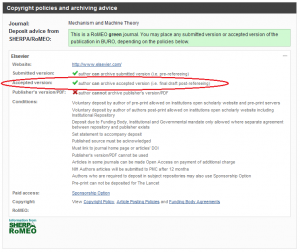
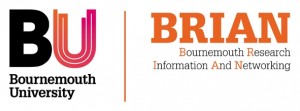


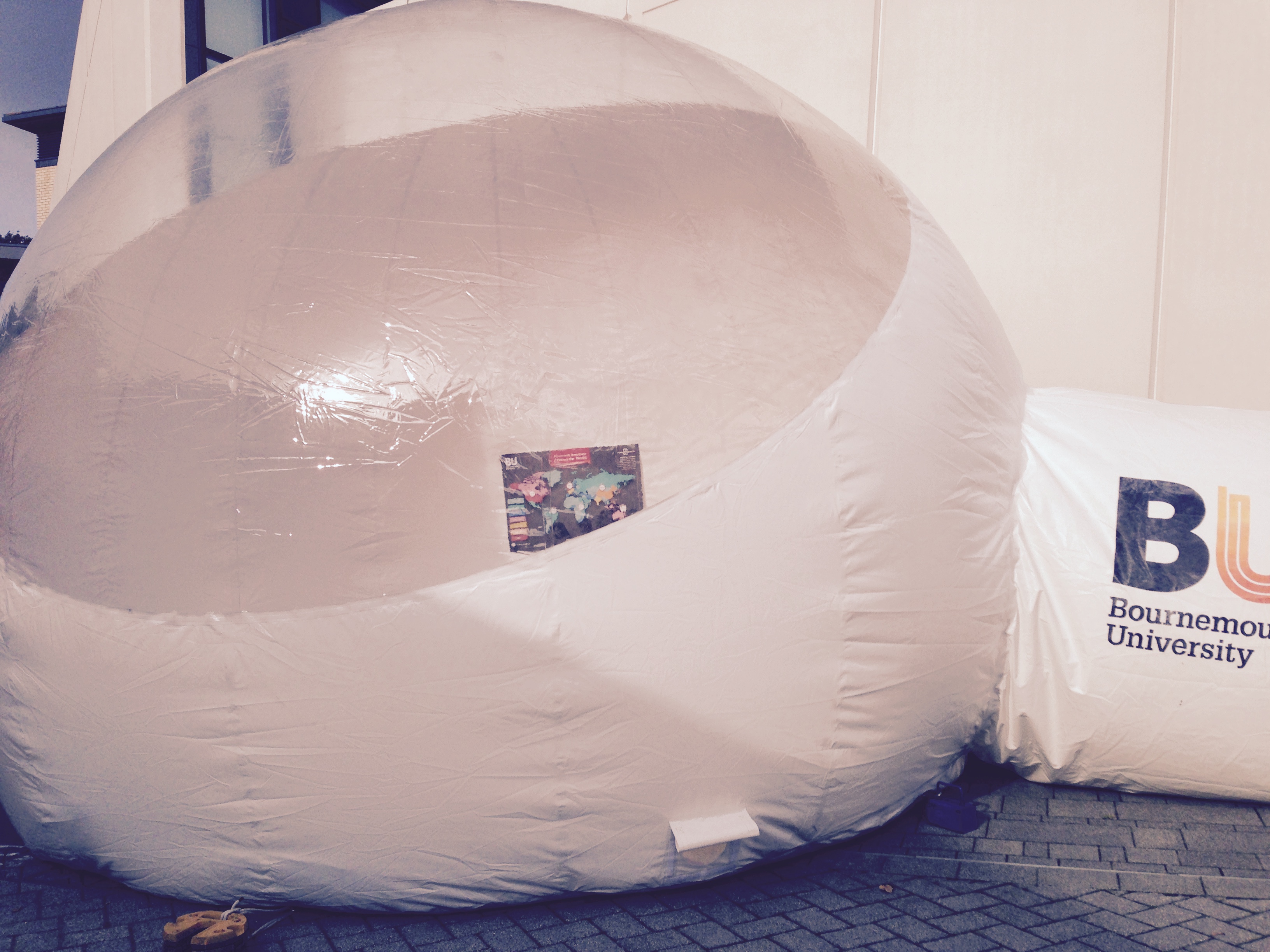 If you think that the Open Access Bubble looks cool from the outside, check out the inside
If you think that the Open Access Bubble looks cool from the outside, check out the inside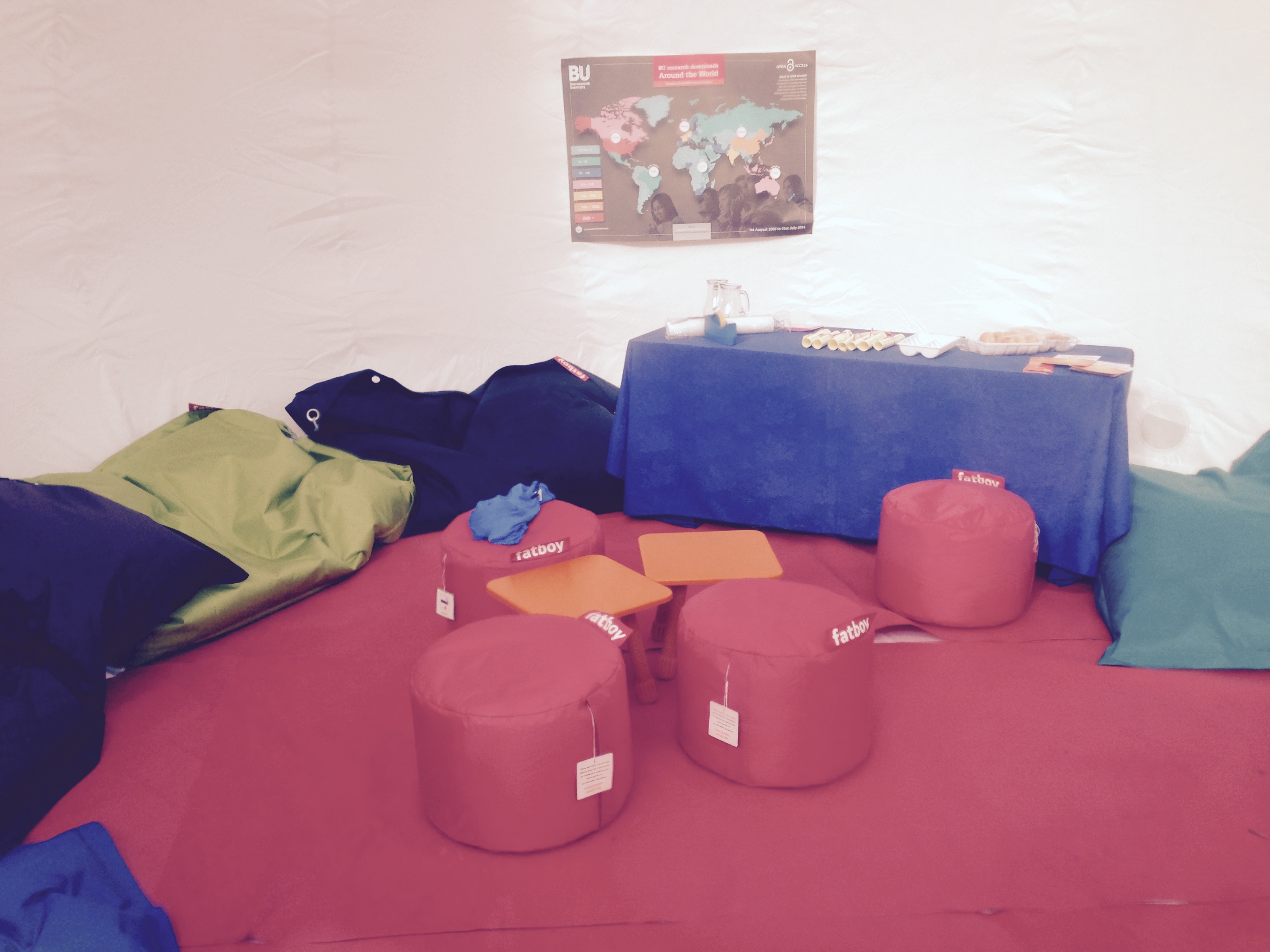 There is a Bubble talk every day from 10am to 11am, covering important topics like ‘The Benefits of Open Access’, ‘Open Access and the Philosophy of Openness’ and ‘Public Engagement Opportunities for Academics and Open Access’. Not only that, we also offer free doughnuts to visitors of the dome. You also get to laze on the bean bags while you watch some interesting video abstracts featuring some of our open access publications; and videos on the importance of open access.
There is a Bubble talk every day from 10am to 11am, covering important topics like ‘The Benefits of Open Access’, ‘Open Access and the Philosophy of Openness’ and ‘Public Engagement Opportunities for Academics and Open Access’. Not only that, we also offer free doughnuts to visitors of the dome. You also get to laze on the bean bags while you watch some interesting video abstracts featuring some of our open access publications; and videos on the importance of open access.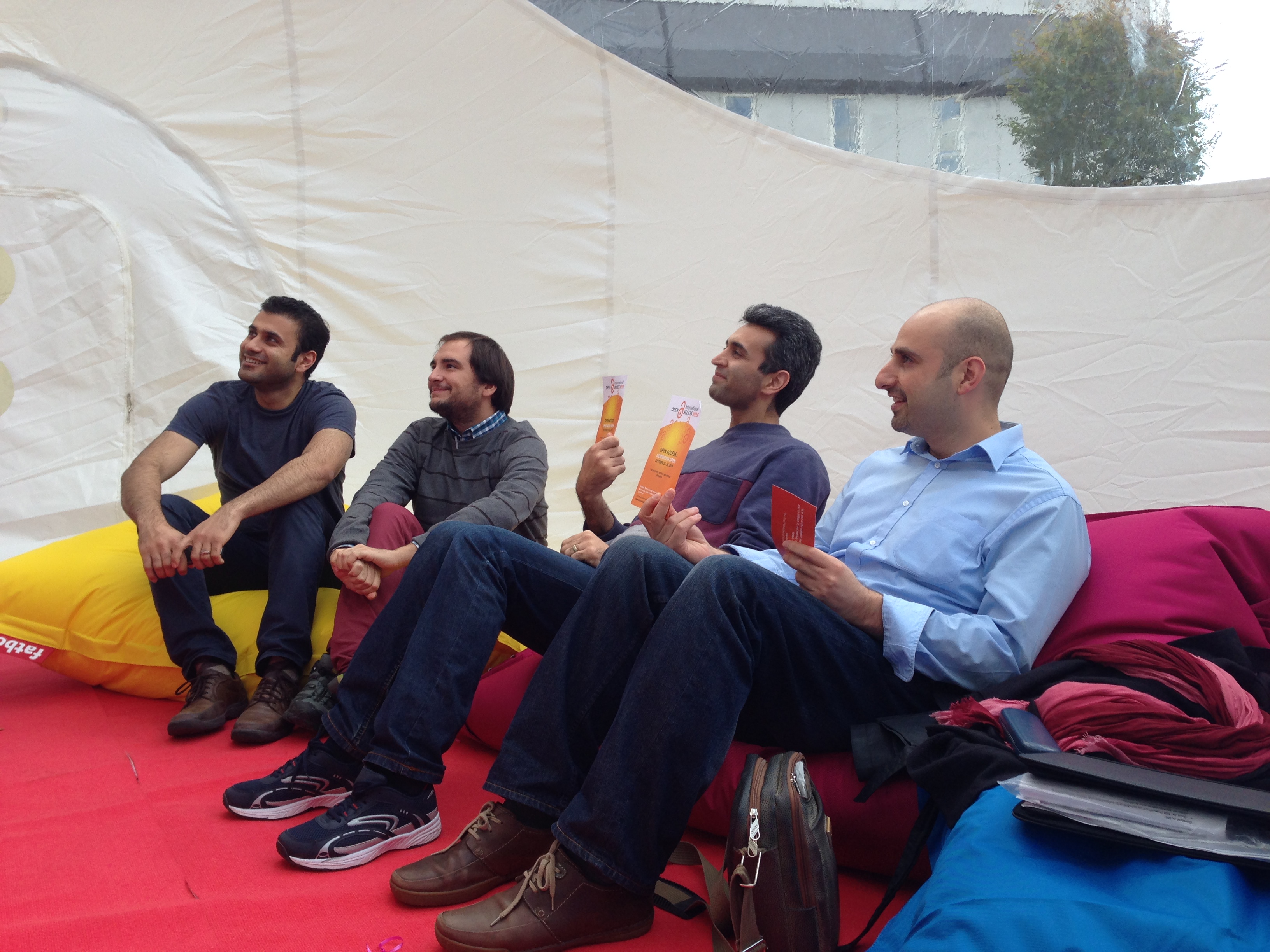 So please take this opportunity, visit the Open Access Bubble and get involved! For information on other events that are taking place, please visit www.bournemouth.ac.uk/open-access
So please take this opportunity, visit the Open Access Bubble and get involved! For information on other events that are taking place, please visit www.bournemouth.ac.uk/open-access
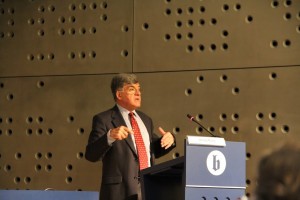
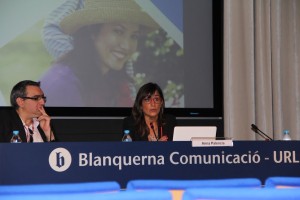
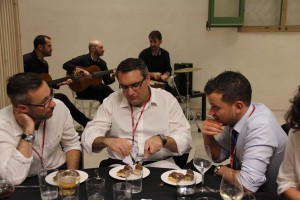
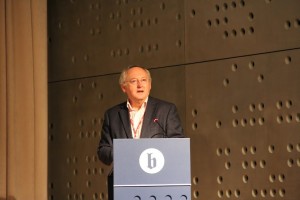
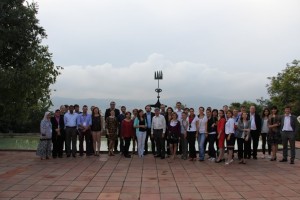
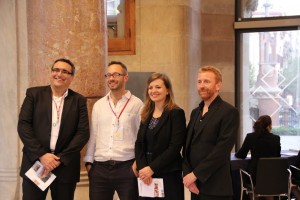
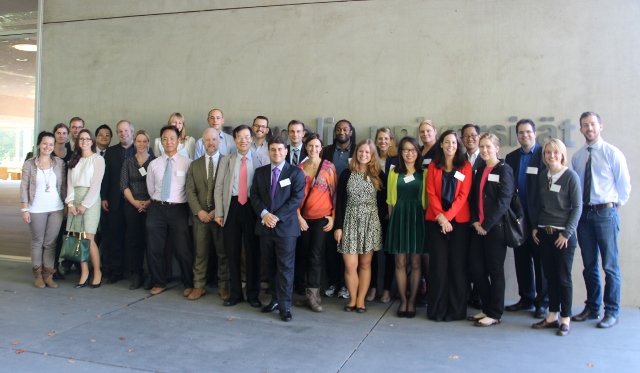


 Get involved. Participating in Open Access Week can be as simple or involved as you like. It can also be a chance to let your imagination have full rein and come up with something more ambitious, wacky, fun.
Get involved. Participating in Open Access Week can be as simple or involved as you like. It can also be a chance to let your imagination have full rein and come up with something more ambitious, wacky, fun. Celebrate Open Access at BU and join us in these exciting events. No need to register, just turn up.
Celebrate Open Access at BU and join us in these exciting events. No need to register, just turn up.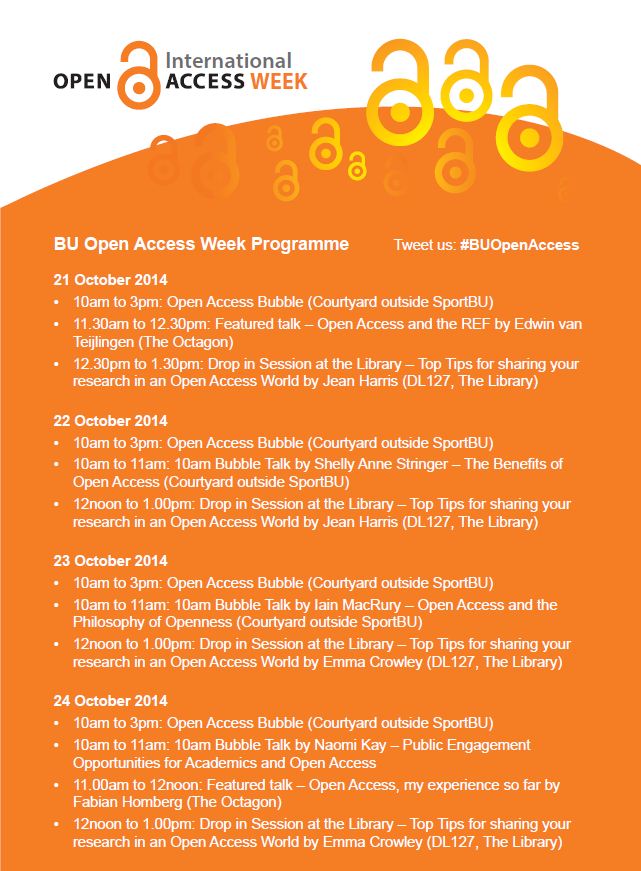
 All logo and colour scheme attributed to : www.openaccessweek.org
All logo and colour scheme attributed to : www.openaccessweek.org
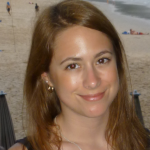

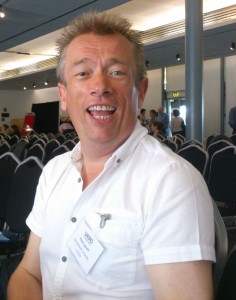













 Fourth INRC Symposium: From Clinical Applications to Neuro-Inspired Computation
Fourth INRC Symposium: From Clinical Applications to Neuro-Inspired Computation Writing policy briefs
Writing policy briefs Upholding Excellence: The Concordat to Support Research Integrity
Upholding Excellence: The Concordat to Support Research Integrity Today’s Documentation Will Serve Tomorrow’s Justice
Today’s Documentation Will Serve Tomorrow’s Justice ECR Funding Open Call: Research Culture & Community Grant – Application Deadline Friday 12 December
ECR Funding Open Call: Research Culture & Community Grant – Application Deadline Friday 12 December MSCA Postdoctoral Fellowships 2025 Call
MSCA Postdoctoral Fellowships 2025 Call ERC Advanced Grant 2025 Webinar
ERC Advanced Grant 2025 Webinar Horizon Europe Work Programme 2025 Published
Horizon Europe Work Programme 2025 Published Horizon Europe 2025 Work Programme pre-Published
Horizon Europe 2025 Work Programme pre-Published Update on UKRO services
Update on UKRO services European research project exploring use of ‘virtual twins’ to better manage metabolic associated fatty liver disease
European research project exploring use of ‘virtual twins’ to better manage metabolic associated fatty liver disease